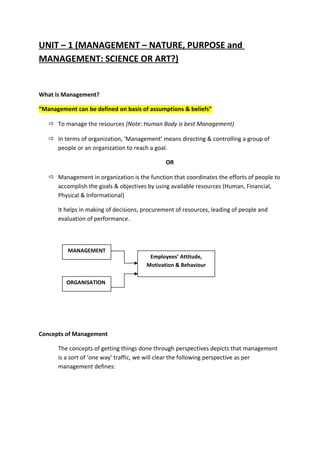
Management, nature, purpose & science or art 1
- 1. UNIT – 1 (MANAGEMENT – NATURE, PURPOSE and MANAGEMENT: SCIENCE OR ART?) What is Management? “Management can be defined on basis of assumptions & beliefs” To manage the resources (Note: Human Body is best Management) In terms of organization, ‘Management’ means directing & controlling a group of people or an organization to reach a goal. OR Management in organization is the function that coordinates the efforts of people to accomplish the goals & objectives by using available resources (Human, Financial, Physical & Informational) It helps in making of decisions, procurement of resources, leading of people and evaluation of performance. Concepts of Management The concepts of getting things done through perspectives depicts that management is a sort of ‘one way’ traffic, we will clear the following perspective as per management defines: MANAGEMENT ORGANISATION Employees’ Attitude, Motivation & Behaviour
- 2. (I) Sociological Perspective: It define management as that group of organizational members who occupy the social positions responsible for making sure that the organization achieve its mission. (II) Process Perspective: An activity concerned with the orchestration of people, work and systems in the pursuit of organizational goals. It can be defined management is as: a). Art of getting things done through people (by Mary Parker Follet)- managers achieve organizational objective by getting work from others. b). As a process (by Henry Fayol) – It contain five functions – Planning, Controlling, Organising, Commanding & Coordinating done by Managers (Top level, Mid-level or Lower level). c). As a group of Managers – Members of the organization assigned primary responsibility for carrying out the management process. d). As a discipline – Universal Application which develop certain principles, generalizations’ & Techniques. Resources Human Financial Physical Informational MANAGEMENT Planning Organising Directing Controlling Goal Achievement
- 3. Nature of Management Management is a diverse action having the following salient features or characteristics: 1). Goal Oriented: Management coordinates the efforts of workers to achieve the goals of the organization. It should be well-defined and properly understood by the managers. 2). Economic Resources: Management is also the factor of production together with Land, Labour and capital. It is the force which assembles and integrates other resources, namely, labour, capital and materials. 3). Distinct Process: It consist such functions as Planning, Organising, staffing, Directing and Controlling. It involves decision-making and putting of decisions into practice. 4). Integrative Process: Managers apply knowledge, experience and management principles for getting the results from the workers by the use of non-human resources. 5). Intangible Force: It has been called as Unseen force which means effectiveness of management on the basis of the end results, although they can’t observe it during operation. 6). Result through others: Managers must have the necessary ability and skills to get work accomplished through the efforts of others. 7). System of Authority: Managers as a team of managers represents a system of authority, a hierarchy of command and control. Managers at different levels possess varying degrees of authority. 8). Multi-disciplinary Subject: Management grown as a field of study taking the help of so many disciplines such as Engineering & Human relations Orientation.
- 4. 9). Universal Application: The principles and techniques of management are equally applicable in the field of business, education, military, government and hospital. MANAGEMENT: A SCIENCE AND AN ART Management plan to implement policies then firstly gain knowledge through researches then apply it to employees. Science is to seek knowledge & Art is to apply knowledge. We briefly describe the statement: “Management is a Science and an Art” as follows- Science is 1) Is the broad interdisciplinary study of problem solving & decision making in human organizations. 2) It uses various scientific research-based principles, strategies and analytical methods to improve an organization’s ability to enact rational and meaningful management decisions by arriving at optimal or near optimal solutions. 3) Systematically organized body of knowledge, skills & techniques based on proper findings & exact principles & is capable for verification: Its principles’, generalizations’ and concepts are systematically. In this case the manager can manage the situation or organization in a systematic and scientific manner. 4) Should have a method of scientific enquiry: It are formulated on the basis of observation, research, analysis and experimentation, as in the case with the principles of other sciences. 5) Establish cause & effect relationship: it states that same cause under similar circumstance will produce same effect. 6) Should be verifiable: management priniciples are codified and systematic, and can be transferred from one to another and can be taught.
- 5. 7) Should ensure predictable results: 8) Have universal application: Art is as 1) Denotes personal skills: the process of management does involve the use of know-how and skills. 2) Signifies practical knowledge: management is personalized, every manager has to apply hid knowledge and skills to deal with various situations. 3) Helps in achieving concrete results: the process of management is directed towards the accomplishment of concrete results. 4) Creative in nature: management is creative in the sense that managing creates new situations needed for further improvement. 5) Manager is an artist to manage the resources (Human, Financial, and Physical & Informational): he applies the knowledge gained from the study of science of management for managing human and material resources.
- 6. 7) Should ensure predictable results: 8) Have universal application: Art is as 1) Denotes personal skills: the process of management does involve the use of know-how and skills. 2) Signifies practical knowledge: management is personalized, every manager has to apply hid knowledge and skills to deal with various situations. 3) Helps in achieving concrete results: the process of management is directed towards the accomplishment of concrete results. 4) Creative in nature: management is creative in the sense that managing creates new situations needed for further improvement. 5) Manager is an artist to manage the resources (Human, Financial, and Physical & Informational): he applies the knowledge gained from the study of science of management for managing human and material resources.